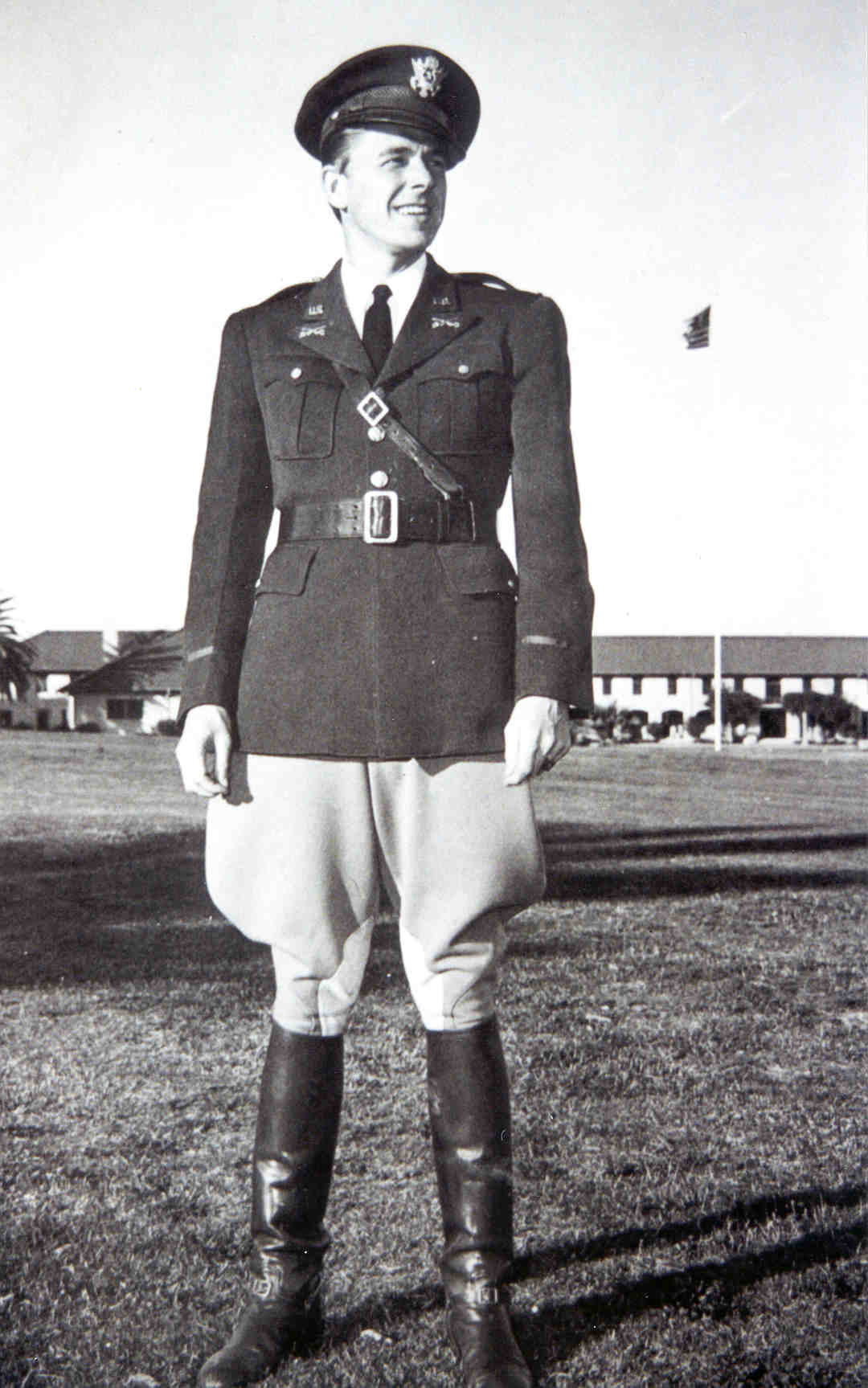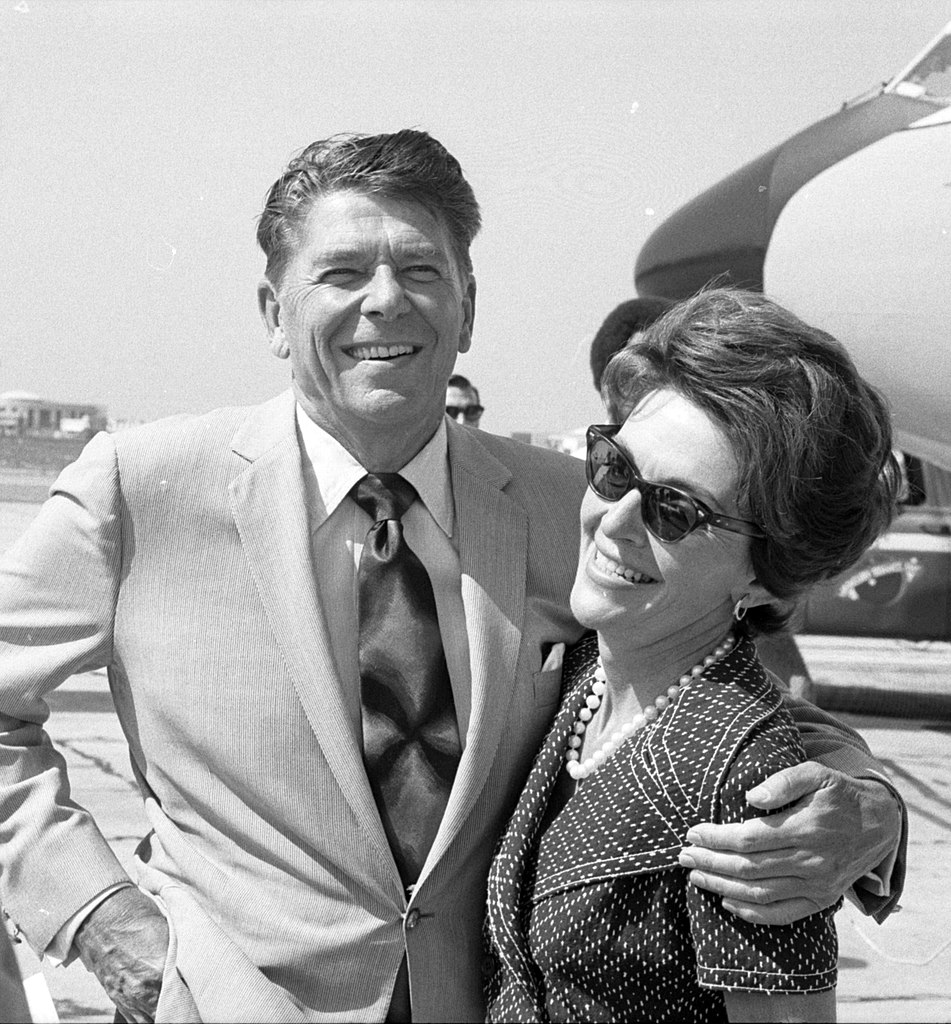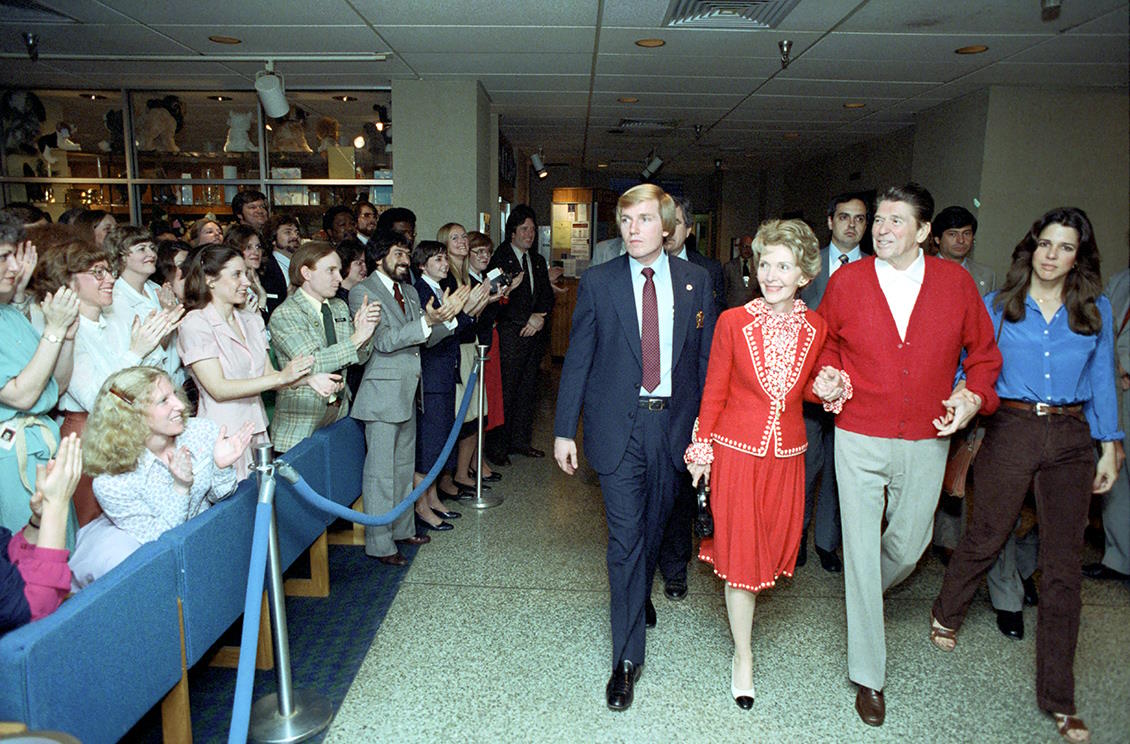Resources
Visit Homeschool History to explore resources about Ronald Reagan and the Cold War.
Transcript and Photos
Ray Notgrass: On today’s Exploring History podcast, we’ll look at the life and faith and world impact of our 40th president, Ronald Reagan.
Titus Anderson: [music in background] Welcome to Exploring History with Ray Notgrass, a production of Notgrass History.
Ray Notgrass: I’m Ray Notgrass. Thanks for listening. Today I’d like to survey the life of Ronald Wilson Reagan, 40th president of the United States, looking especially at his Christian faith and how he helped change the dynamics of the world scene. Reagan wasn’t perfect. He had his faults. But what I appreciate about him was his deep personal reliance on God and how he was willing to confront a difficult relationship with the Communist Soviet Union in a way that dramatically changed the way the world operated.
Reagan was born in the small town of Tampico, Illinois, in 1911, the son of Nelle and Jack Reagan. Jack bounced from job to job and moved his family from town to town, but Nelle was the strong center of their family. Jack was also an alcoholic, which caused additional instability in their family. Nelle was a woman of strong faith and led her sons into that faith. She was a member of the Disciples of Christ, and Ron was baptized when he was eleven. Throughout his life, which took him to many places and involved many activities, Reagan always had a strong faith in God and a great dependence on prayer. Nelle set a strong example of the Christian life. For instance, when prisoners would be released from the local jail, Nelle often welcomed them into the Reagan home on their first night of freedom so they could get cleaned up and prepare to take a responsible role in the community.
Ron was a good student and hardworking athlete. He attended Eureka College in Eureka, Illinois, which is associated with the Disciples of Christ, majoring in economics and sociology. Ron took an interest in acting in school plays and decided to seek a career in entertainment. He started out as a radio announcer at small Midwestern stations, then he headed west and pursued a career as a movie actor. He landed parts in several movies and was considered a rising star. During World War II, he helped make movies for the Army. At the time, Reagan described himself politically as a Roosevelt New Deal Democrat.
After the war, Reagan took an interest in the organization of the Screen Actors Guild, a labor union for actors. Later in his life, Reagan often said that he was the only president who was a card-carrying member of a union. In his role as president of the guild, Reagan became aware of attempts by Communists to infiltrate and influence the union and the movie industry as a whole. This was in the late 1940s, when the influence of Communists was a hot issue throughout the country. Reagan came to see the dangers of Communism and fought their influence hard.
In the 1950s Reagan became host of the long-running television series General Electric Theater. The show had a different storyline each week. Such programs were called anthology series. Sometimes Reagan had a part in the show, while at other times he merely introduced that week’s drama. Part of Reagan's work with the General Electric Company was to travel around the country and visit GE factories. As he did so, he made speeches about the strong principles that GE stood for, but he also heard the thoughts of many workers on the assembly lines, typical Americans who loved their country and supported their families. Gradually Reagan came to see that he no longer agreed with the Democratic Party’s positions. In 1962 Reagan changed his party registration to Republican. He became active in Republican political circles.
In 1964 Barry Goldwater was the Republican presidential nominee. Goldwater was a staunch conservative who frankly didn’t stand a chance against the incumbent president, Lyndon Johnson. Late in the campaign Reagan made a televised speech in support of Goldwater that he called “A Time for Choosing.” In the speech, Reagan outlined the conservative principles that he had come to believe, and believed in strongly. The speech didn’t do much to help Goldwater, whom Johnson indeed swamped in the election, but it put Reagan on the political map and marked him out as someone to watch in the future.
Following Goldwater’s landslide loss, some political observers wondered if the Republican Party could field viable candidates any longer. Meanwhile, Reagan was deciding his political course. In 1966 he ran for governor of California, a state that was not easy for Republicans, and he won the election. Two years later, Richard Nixon won the presidential election, and it appeared that the Republicans had come back to life. Reagan won reelection as governor in 1970, and he began thinking seriously about pursuing even higher office.
In 1975 Reagan began recording daily political radio commentaries that were distributed across the country. He recorded over 1,000 of these commentaries in the ensuing years. These short radio programs helped to make Reagan a household political name and allowed him to outline his positions on issues of the day to his listeners. He continued these broadcasts until 1979. In 1976 Reagan challenged the incumbent Republican president, Gerald Ford, for that year’s Republican presidential nomination. Ford had become president when Richard Nixon had resigned in 1974, and Reagan thought that Ford would not be a strong candidate. But Ford had enough strength in the Republican Party to win the nomination, and Reagan’s challenge seemed poorly timed. Ford narrowly lost the 1976 election to Democrat Jimmy Carter.
Then in 1980 Reagan again sought the Republican nomination, and this time he received it. Jimmy Carter’s one term in office had been marked by high inflation, an energy crisis, and trouble on the international scene. Reagan easily defeated Carter’s bid for reelection.
Reagan was sworn into office on January 20, 1981. Just six weeks later, on March 30, 1981, Reagan was seriously wounded in an assassination attempt outside of a Washington hotel where he had just given a speech. As he was being prepped for surgery, Reagan’s remarkable sense of humor came through. When his wife Nancy came into the room, Reagan said, “Honey, I forgot to duck.” As the medical staff was gathered around him, Reagan quipped, “I hope you’re Republicans.” The surgeon replied, “Mr. President, today we are all Republicans."
Reagan made a successful recovery. A few days later, Reagan wrote in his journal, “Whatever happens now I owe my life to God and will try to serve him in every way I can.”
During Reagan’s presidency, the Cold War standoff between the United States and the Communist Soviet Union was in full force. Both sides were engaged in a major arms buildup and challenged each other for influence in the world. Both countries had allies in various other countries around the world. Every day the world lived in tension that one day the confrontation would go too far and some sort of armed conflict, perhaps involving nuclear weapons, would begin and have catastrophic results.
For decades the policy of the United States was to try to contain the influence of the Soviets around the world and to maintain a peaceful coexistence with them, uneasy as that coexistence was. The buildup of weapons on both sides led to the standoff that was called Mutual Assured Destruction–the idea that if one side started a nuclear war, the other side could respond with enough weaponry that both countries and perhaps the world would be destroyed. The acronym for the term Mutual Assured Destruction was MAD. That is exactly what Reagan thought of it: he believed it was pure madness, and he believed the standoff was a moral issue.
Ronald Reagan had a different philosophy. He had seen the harmful influence of Communism up close. He knew that godless Communism robbed people of their spiritual freedom and that Communist economic and government policies robbed people of their personal freedom and left them impoverished. He wanted to help end the harmful and dangerous influence of Communism in the world. In 1977 an advisor asked Reagan for his theory regarding U.S.-Soviet relations. Reagan replied, “Here’s my strategy on the Cold War: we win, they lose.” That sounds warlike, but there are many ways to defeat an enemy, even without a shot being fired, and that’s what Reagan worked to accomplish.
When Reagan took office as president, the American economy was struggling. Reagan took steps to help the economy recover, and his policies were successful. When Reagan took office, the U.S. military was underfunded and discouraged. Reagan built up the military to be a stronger fighting force. Then Reagan took an additional step. In March of 1983, Reagan proposed the building of what he called the Strategic Defense Initiative, or SDI. This would be a system in space to defend the United States from missile attacks using lasers and interceptor missiles. Critics and the press called it “Star Wars,” because it seemed as outlandish as the Star Wars movies that were coming out at the time. Reagan proposed SDI as a defensive system. It posed no threat to the Soviet Union, but it challenged the Soviets to pay for and develop a reply.
The Communist economic system of socialism does not work. It is top heavy with bureaucrats and does not respond to market forces. It gives no incentives for workers to work hard or for people to start their own businesses in order to succeed financially. As a result, when Mikhail Gorbachev became leader of the Soviet Union in 1985, the Soviet economy was already in deep trouble. Gorbachev promised reform and openness, but it was slow in coming. The Soviet people wanted the freedom and opportunity that they heard about in the United States and in other world democracies. In his meetings with Reagan, Gorbachev offered to eliminate a large number of nuclear weapons if the United States would give up SDI. Gorbachev knew that the cost of a competing system was something the Soviet Union could not afford. Reagan refused. It appeared that Reagan was walking away from an opportunity to ease the Cold War, but what Reagan was really doing was increasing the pressure on the already weak Soviet system.
In this way, Reagan challenged the political, military, and economic aspects of the Soviet Union. He then challenged the moral and personal aspects of the Soviet system. When Reagan took office, for years the Soviet Union had held tight control over several countries in Eastern Europe, including Poland, Hungary, Czechoslovakia, Romania, Bulgaria, and East Germany. Reagan once called the Soviet Union and its satellite states an evil empire. The most glaring symbol of this oppressive control was the Berlin Wall, which Communist East Germany, supported by the Soviet Union, had built in 1961 to separate Communist East Berlin from democratic West Berlin and to keep citizens of East Berlin from escaping to the West.
For 26 years the leaders of western democracies lamented the presence of the wall. They expressed hope for the day when East and West Berlin would be reunited. Ronald Reagan took a more direct approach. On June 12, 1987, President Reagan delivered a speech in West Berlin, standing before the Brandenburg Gate and the Berlin Wall. In that speech he said:
“General Secretary Gorbachev, if you seek peace, if you seek prosperity for the Soviet Union and Eastern Europe, if you seek liberalization, come here to this gate. Mr. Gorbachev, open this gate. Mr. Gorbachev, tear down this wall.”
Some of Reagan’s advisors warned him against including this challenge in his speech. They thought it was too inflammatory. But Reagan had a grasp of the entire situation. Just as he had challenged the Soviet military and economic system with SDI, he challenged Communist morality and its view of people with the call to tear down the Berlin Wall. Two years later the Berlin Wall came down, the result of increasing political pressure on Communist governments and a great deal of prayer–but that’s a story we’ll have to tell another day. Within a few years the Communist governments in the Soviet Union and other Eastern European countries had fallen. The fall of Communism was not just because of military buildup or economic pressure. Communism is a hollow system that fell because it could not meet the genuine human needs of the people living under it. In other words, we won, they lost. By the way, the Strategic Defense initiative was never built. It never got past the research phase, and President Clinton canceled it in 1993; but the threat of building it had done its job.
Ronald Reagan was not a perfect president. Budget deficits while he was president grew significantly, but that wasn’t all his fault. The Democratic Congress that set the budget shared the blame. The Iran-Contra scandal, which again we’ll have to describe another time, was a blot on his presidency. But President Ronald Reagan inspired a renewed confidence in the hearts of the American people and an appreciation for the greatness of our country. He was a true leader, and he was a man of faith. How desperately we need those traits today!
One more story illustrates to me the impact of Reagan’s life and presidency. During and after Reagan’s time in office, many critics dismissed him as backwards, a warmonger, merely a second-rate actor, and an ineffective leader. That became the accepted appraisal of Reagan. But when he died in 2004 after struggling with Alzheimer’s for many years, the outpouring of grief and respect by the American people was overwhelming. Thousands of people stood in line for hours just to walk past his casket as it lay in the rotunda of the U.S. Capitol. That is the appraisal of Ronald Reagan and his presidency that will always stay with me.
I’m Ray Notgrass. Thanks for listening.
Titus Anderson: This has been Exploring History with Ray Notgrass, a production of Notgrass History. Be sure to subscribe to the podcast in your favorite podcast app. And please leave a rating and review so that we can reach more people with our episodes. If you want to learn about new homeschool resources and opportunities from Notgrass History, you can sign up for our email newsletter at ExploringHistoryPodcast.com. This program was produced by me, Titus Anderson. Thanks for listening!
Visit Homeschool History to explore resources about Ronald Reagan and the Cold War.







